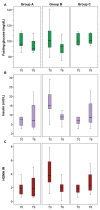Effect of Mediterranean Diet and Antioxidant Formulation in Non-Alcoholic Fatty Liver Disease: A Randomized Study
- PMID: 28805669
- PMCID: PMC5579663
- DOI: 10.3390/nu9080870
Effect of Mediterranean Diet and Antioxidant Formulation in Non-Alcoholic Fatty Liver Disease: A Randomized Study
Abstract
Non-alcoholic fatty liver disease (NAFLD) is the most common liver disease worldwide, characterized by liver fatty acid accumulation and fibrosis, not due to excessive alcohol consumption. Notably, nutritional habits have been reported to be implicated in the onset and severity of the hepatic damage, while the Mediterranean diet has shown beneficial effects on NAFLD. Free radicals and oxidative stress were suggested to be involved in the pathogenesis and progression of NAFLD, and several data highlighted the efficacy of antioxidant supplementation in its treatment. The aim of this study was to compare the effects of the Mediterranean diet, with or without an antioxidant complex supplement, in overweight patients suffering from NAFLD. In this prospective study, fifty Caucasian overweight patients were randomized into three groups (Groups A-C). A personalized moderately hypocaloric Mediterranean diet was prescribed to all patients included in the A and B groups. In addition to the diet, Group B was administered antioxidant supplementation daily and for the period of six months. Group C did not have any type of treatment. The study proved that the Mediterranean diet alone or in association with the antioxidant complex improved anthropometric parameters, lipid profile and reduced hepatic fat accumulation and liver stiffness. However, Group B patients, in which the diet was associated with antioxidant intake, showed not only a significant improvement in insulin sensitivity, but also a more consistent reduction of anthropometric parameters when compared with Group A patients. Taken together, these results support the benefit of antioxidant supplementation in overweight patients with NAFLD.
Keywords: Mediterranean diet; antioxidant; insulin resistance; non-alcoholic fatty liver disease; weight.
Conflict of interest statement
The authors confirm that they have no conflicts of interest whatsoever, not even with the company that produces Bilirel (Pharmaluce, Republic of San Marino). This is in line with our conflicts of interest statement.
Figures
References
-
- Lonardo A., Ballestri S., Guaraldi G., Nascimbeni F., Romagnoli D., Zona S., Targher G. Fatty liver is associated with an increased risk of diabetes and cardiovascular disease—Evidence from three different disease models: NAFLD, HCV and HIV. World J. Gastroenterol. 2016;22:9674–9693. doi: 10.3748/wjg.v22.i44.9674. - DOI - PMC - PubMed
Publication types
MeSH terms
Substances
LinkOut - more resources
Full Text Sources
Other Literature Sources
Medical


